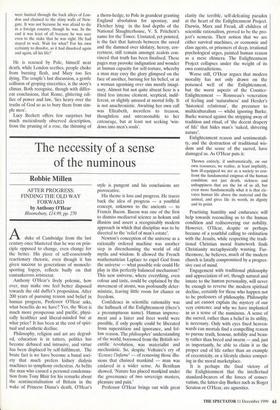The necessity of a sense of the numinous
Robbie Millen AFTER PROGRESS: FINDING THE OLD WAY FORWARD by Anthony O'Hear Bloomsbury, f14.99, pp. 270 Aduke of Cambridge from the last century once blustered that he was on prin- ciple opposed to change, even change for the better. His piece of self-consciously reactionary rhetoric, even though it has given succour to generations of monocle- sporting fogeys, reflects badly on that cantankerous aristocrat.
Anthony O'Hear's lively polemic, how ever, may make one feel better disposed towards the old duffer's proposition. After 200 years of pursuing reason and belief in human progress, Professor O'Hear asks, what benefits do we have? Yes, the West is much more prosperous and pacific, physi- cally healthier and liberal-minded but at what price? It has been at the cost of spiri- tual and aesthetic decline.
Philosophy, religion and art are degrad- ed, education is in tatters, politics has become debased and intrusive, and virtue has been displaced by self-fulfilment. The brute fact is we have become a banal soci- ety that much prefers kidney dialysis machines to symphony orchestras. As befits the man who earned a personal condemna- tion from Tony Blair for his remarks about the sentimentalisation of Britain in the wake of Princess Diana's death, O'Hear's style is pungent and his conclusions are provocative.
His theme is loss and progress. He traces back the idea of progress — a youthful concept, unknown to the ancients — to Francis Bacon. Bacon was one of the first to dismiss mediaeval science as hokum and illusion and assert a recognisably modern approach in which that discipline was to be directed to the 'relief of man's estate'.
Newton's conception of the universe as a rationally ordered machine was another step in disenchanting the world of old myths and wisdom. It allowed the French mathematician Laplace to expel God from the universe — what possible role could He play in this perfectly balanced mechanism? This new universe, where everything, even colour and taste, could be explained by the movement of atoms, was profoundly deter- ministic, leaving little room for chance or freedom.
Confidence in scientific rationality was the hallmark of the Enlightenment (there's a presumptuous name). Human improve- ment and a fairer and freer world were possible, if only people could be liberated from superstition and ignorance, and fol- low reason. The philosopher' understanding of the world, borrowed from the British sci- entific revolution, was materialist and mechanistic. So, despite .Voltaire's cry of 'Ecrasez l'infame' — of removing those illu- sions that chained mankind — man was enslaved in a wider sense. As Bentham showed, 'Nature has placed mankind under the governance of two sovereign masters, pleasure and pain.'
Professor O'Hear brings out with great clarity the terrible, self-defeating paradox at the heart of the Enlightenment Project. Darwin, Marx and Freud, all children of scientific rationalism, proved to be the pro- ject's nemesis. Their notion that we are either survival machines, or economic and class agents, or prisoners of deep, irrational psychological urges, painted human reason as a mere chimera. The Enlightenment Project collapses under the weight of its own contradictions.
Worse still, O'Hear argues that modern morality has not only drawn on the poisoned well of the Enlightenment, but the worst aspects of the Counter- Enlightenment — Rousseau's veneration of feeling and 'naturalness' and Herder's 'historical relativism', the precursor to multiculturalism — whilst ignoring Burke. Burke warned against the stripping away of tradition and ritual, of 'the decent drapery of life' that hides man's 'naked, shivering nature'.
Enlightenment reason and sentimentali- ty,. and the destruction of traditional wis- dom and the sense of the sacred, have damaged us. As O'Hear puts it: Thrown entirely, if undramatically, on our own resources, we realise, at least implicitly, how ill-equipped we are as a society to con- front the fundamental enigmas of the human condition: not just death, sickness and unhappiness that are the lot of us all, but even more fundamentally what it is that ele- vates human life above the material and the animal, and gives life its worth, its dignity and its point.
Practising humility and endurance will help towards reconciling us to the human condition and rediscovering our nobility. However, O'Hear, despite or perhaps because of a youthful calling to ordination with the Jesuits, while respecting the tradi- tional Christian moral framework finds Christianity metaphysically wanting. Fur- thermore, he believes, much of the modern church is fatally compromised by a progres- sive cast of mind.
Engagement with traditional philosophy and appreciation of art, though natural and innate to the human personality, will never be enough to reverse the modern spiritual decline, certainly for those who happen not to be professors of philosophy. Philosophy and art cannot explain the mystery of our very existence and why we have implanted in us a sense of the numinous. A sense of the sacred, rather than a belief in its utility, is necessary. Only with eyes fixed heaven- wards can mortals find a compelling reason to pursue truth, honour, nobility and beau- ty rather than breed and swarm — and, just as importantly, be able to claim it as the proper end of life rather than an example of eccentricity, or a lifestyle choice compet- ing in the moral marketplace.
It is perhaps the final victory of the Enlightenment that the intellectual standard-bearers of the forces of conser- vatism, the latter-day Burkes such as Roger Scruton or O'Hear, are agnostics.


























































































 Previous page
Previous page